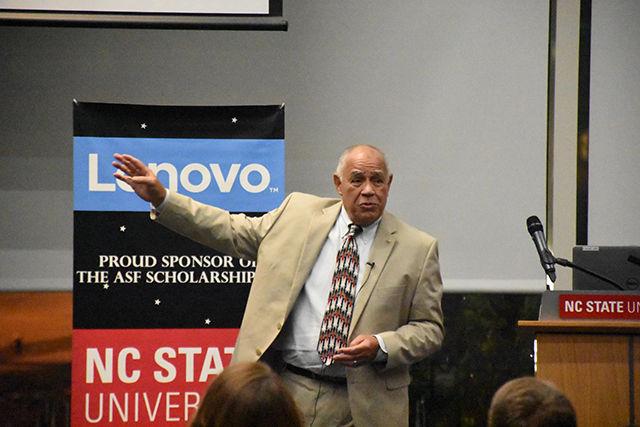Renowned NASA astronaut Frederick Gregory presented an NC State student with a scholarship in Hunt Library Wednesday, preceding a lecture about his own life as a test pilot and the first African-American space commander.
Gregory presented the $10,000 award, which comes from the Astronaut Scholarship Foundation, to Samuel Jasper, a senior studying textile and chemical engineering.
Jasper merited the award after several professors referred him to the ASF for his research last summer on lithium-ion batteries and for his contribution to several book chapters and peer-reviewed publications.
“It is such an honor to be able to come to this school and make a presentation to a person who will be the future of this country,” Gregory said. “I’m very proud to be a part of that.”
After awarding the scholarship, Gregory began his lecture with his childhood. He grew up in Washington, D.C. at the feet of his father, an avid tennis player and electrical engineer. His father also encouraged him to become an independent man through high adventure trips with the Boy Scouts of America and during extended summer camps away from home.
Although Gregory never played tennis like his father planned, he grew increasingly interested with the idea of flying. As a 5-year-old, Gregory’s father allowed his close friend, Ben Davis, the commander of the Tuskegee airmen, to fly Gregory in his plane from a nearby airstrip in Maryland. Gregory’s mother quickly impeded the process, ordering Davis that, “you will not fly with my son in this airplane.”
Gregory obeyed his mother then, taking a grounded drive around the airstrip. But after attending air shows featuring a fighter jet group, the Thunderbirds, he became engrossed in deep fascination with joining its ranks.
Hence, he joined the United States Air Force to obtain a Bachelor of Science degree and become a pilot. While studying at the Academy at Colorado Springs, Gregory studied classical English literature and specialized in helicopter flight. Gregory continued to serve in the U.S. Air Force after graduating, working as a helicopter rescuer during the Vietnam War for a year.
Five years out of college, monotonous helicopter pilot work schedules dampened Gregory’s aspirations to continue his career as a helicopter pilot.
“Every morning, I get up, I go to work,” Gregory said. “They would brief me on the flights that I would take. I go flying all day, and come to the afternoon, I would come back and debrief, and then I come home — every day, the same thing. If you don’t recognize it, that is a rut.”
Gregory did not allow himself to become discouraged.
“This is where I began to question what I was going to do in the future, and I decided that whatever it was, I had to have fun doing it, but at the same time, I had to make a contribution,” he said. “With a goal like that, I could do anything.”
Through other career stagnations, Gregory looked to a different outlet for his flight ambitions. After seeing Nichelle Nichols, Lieutenant Uhura from Star Trek, campaigning for NASA’s astronaut program, Gregory applied and was accepted to NASA Astronaut Group 8, a group of 35 pilots and specialists. The group included world renown astronauts Sally Ride, the first woman in space, and Guion Bluford, the first African-American in space.
Gregory worked with Group 8 for three space flight missions: Challenger, Discovery and Atlantis. As a captain on the orbiter Discovery, Gregory became the first African-American space commander. While engaging, Gregory grew disconnected from the routine nature of space flight.
“It’s the most fantastic experience that you could ever have,” Gregory said. “There was not an ego in the Group. There’s no professional talking, and people are laughing—and you come home; you write a report.”
Gregory soon switched into administration at NASA, and he eventually rose to become the deputy administrator of NASA. After briefly describing his retirement, Gregory ended his speech with his original adage.
“Have fun, and make a contribution,” Gregory said.
Malik Majet, a sophomore studying computer science, attended the event in support of the National Society of Black Engineers, a group which had previously given Gregory its distinguished scientist award.
“At the end of the story, I didn’t want it to end,” Malik said. “It makes you think about what you’ve done in the past and who you have connections with. It’s good to have someone who you can see yourself being.”








